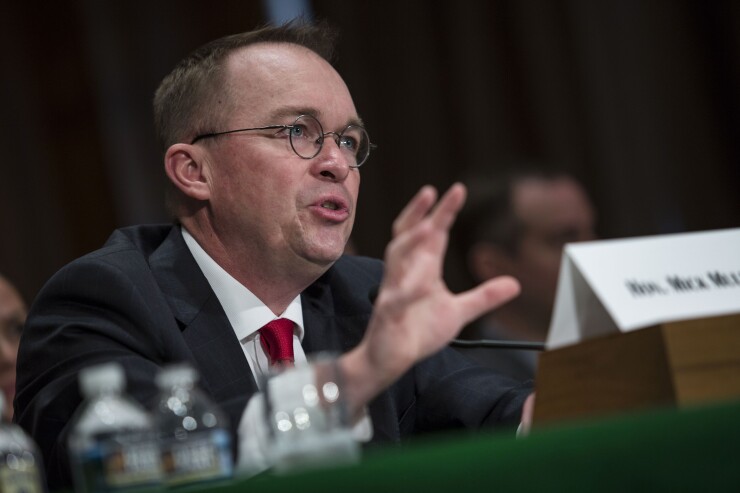The Consumer Financial Protection Bureau is revamping a program to encourage innovation in consumer disclosures after an earlier effort drew little industry interest.
In 2013, the bureau under former CFPB Director Richard Cordray developed a safe harbor from liability for companies experimenting with product disclosure changes. But the policy, authorized by the Dodd-Frank Act, was seen as too restrictive and attracted few applicants. A company had to show that the disclosure changes increased consumer understanding.
In a more industry-friendly approach under acting Director Mick Mulvaney, the bureau has proposed a “disclosure sandbox.” Rather than focusing just on consumer benefits, the proposal would grant waivers if a disclosure change resulted in one of three outcomes: better cost-effectiveness, delivery mechanism or consumer understanding.

“Under the old policy, the CFPB would not approve a trial disclosure program if the only benefit was cost-effectiveness,” said Richard Horn, a founder of Garris Horn in Tucson, Ariz., and a former CFPB special counsel and special adviser. “This looks like they will just let you to test to see if it improves your business. With the new proposal, they didn’t make consumer understanding a requirement.”
Dodd-Frank gave the CFPB the authority to allow trial disclosure programs with a safe harbor from private lawsuits, attorney generals’ actions and federal regulatory actions including enforcement by the agency.
To encourage more companies to apply, the CFPB, which unveiled the proposal in a
The CFPB has proposed establishing a two-year timeframe for the testing of disclosures. It also plans to coordinate with state regulators so companies can apply through so-called state regulatory sandboxes rather than apply separately through the CFPB.
Lawyers said the proposal is low-hanging fruit for the agency’s Office of Innovation since the changes are focused only on changes to consumer disclosures and not broader fintech policies. Only two companies had applied for the trial disclosure process through the 2013 policy created under Cordray, according to experts.
The bureau did not specifically spell out how the proposal is different from earlier procedures. Instead, the Sept. 10 Federal Register notice made a general reference to “several elements” it was proposing to eliminate from the previous program.
“The Bureau is proposing to streamline the application process by eliminating several elements that it has now deemed were redundant or otherwise unnecessary,” the agency said in the notice. “The list of factors the Bureau intends to consider when reviewing applications has been substantially reduced for similar reasons. As a result, the Bureau’s proposed review will now focus on the quality and persuasiveness of the application, especially the extent to which the trial disclosures are likely to be an improvement over existing disclosures, and the extent to which the testing program mitigates risks to consumers.”
Some observers said while innovation in disclosures has not caught up with other means of technological delivery, companies have still not seen much incentive to make improvements.
“There are all kinds of inefficiencies created by disclosures that weren’t designed to appear on an iPhone,” said Ben Olson, a partner at Buckley Sandler and a former deputy assistant director at the CFPB. “However, it will be interesting to see if the Bureau gets any takers because, although disclosures can be a headache and some have questionable value, there’s not a lot of money to be made in changing your disclosures. This may be something that the trade associations wind up pursuing on behalf of their members.”
The CFPB said that applications may be submitted by a group, such as a trade association, on behalf of its members.
Virginia O’Neill, a senior vice president at the American Bankers Association and a director of the ABA’s Center for Regulatory Compliance, has asked the CFPB to extend the current 30-day comment period, which ends Oct. 10, by an additional 45 days.
“Significant opportunities exist to enhance consumer protection by facilitating innovation in financial products and services and enabling companies to research and test informative, cost-effective disclosures,” O’Neill wrote in a letter to the agency on behalf of six trade groups, including the American Financial Services Association, Consumer Bankers Association, Credit Union National Association, Independent Community Bankers of America and the U.S. Chamber of Commerce.
“As demonstrated by the failure of the 2013 policy, it is critical that the Bureau appropriately balance the risks and rewards. To that end, the Bureau should provide adequate time for interested parties to review the proposal, evaluate it, and provide meaningful feedback,” she wrote.





